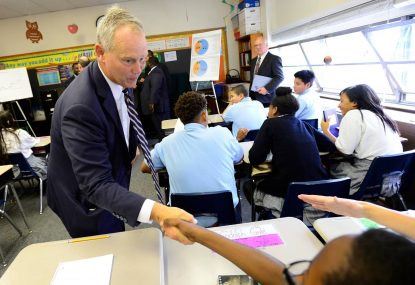Pennsylvania’s Speaker of the House Mike Turzai (R-Allegheny) is passionate about giving parents and grandparents real options for their children’s education. He is spearheading an effort to expand the highly successful Educational Improvement Tax Credit (EITC) and Opportunity Scholarship Tax Credit (OSTC) programs.
The Pennsylvania Catholic Conference asked Rep. Turzai why he is such a strong supporter of school choice.
What does House Bill 250 propose to do?
House Bill 250 would increase tax credits available under the Educational Improvement Tax Credit (EITC) program by $50 million (raising it to $175 million) and the Opportunity Scholarship Tax Credit (OSTC) program by $25 million (raising it to $75 million). It would be a total of $250 million for educational tax credits.
[hotblock]
Last year, EITC represented just 1.5 percent of the $11.4 billion we spent on basic education. If we are going to invest in education, we must recognize that one size does not fit all. Take the Independence Mission Schools in Philadelphia. They educate a very diverse student population; so do the Holy Rosary School in Pittsburgh, Harrisburg Catholic Elementary and suburban high schools like North Catholic in Pittsburgh. Families want their children to attend a school (like these) that provides security, discipline, love and values. EITC and OSTC allow families to receive it; and the scholarships help to keep those schools open so they have that choice to make.
EITC and OSTC help public school students too. Educational improvement organizations use it to support after-school programs with the Big Brothers Big Sisters and pre-K programs. Suburban, urban, rural, public school and nonpublic students of all faiths benefit from EITC and OSTC. HB 250 helps everyone.

Rep. Mike Turzai (R-Allegheny), Speaker of the Pennsylvania House of Representatives, greets students at Harrisburg Catholic Elementary while rallying support for expanding the successful Educational Improvement Tax Credit (EITC) and Opportunity Scholarship Tax Credit (OSTC) programs. (Photo by Chris Heisey, Harrisburg Catholic Witness)
In these austere economic times, what makes increasing the EITC and OSTC programs a good investment for taxpayers?
The vast majority of students in Pennsylvania are educated in public schools. Our public schools need to be good; but in many communities parents and grandparents want an alternative. They pay their taxes to public schools. Their children are entitled to an education. They should have a choice of whichever schools best meet their child’s needs.
Nonpublic schools are already saving the taxpayers a lot of money. The average cost per public school pupil is around $15,000 per year. Given the average per pupil price tag, by taking about 150,000 students out of public schools, Catholic schools saved the taxpayers more than $2.25 billion this year alone.
The governor talks about investment in education. All students need to be part of the equation. If we are going to invest in basic education, we need to invest in EITC and OSTC too. We should raise the percentage in these tax credit programs to a little over 2 percent.
There is great demand for both tax credits and the scholarships they provide. Every year the tax credits “sell out” within a few days of the application deadline. And just one scholarship organization, BLOCS in Philadelphia, received applications from 11,000 families for scholarships for 20,000 students. They were only able to fulfill scholarships for 8,500 families and 12,000 kids. There are waiting lists for both business leaders who want tax credits and students looking for scholarships.
EITC and OSTC scholarships have helped students in many schools both private and public including tens of thousands who attend Catholic schools. What does a Catholic education mean to you personally?
[hotblock2]
My dad was a public school teacher in a great school, but I went to Catholic school. I got a very good education and really benefited personally from that environment. All three of my own boys went to Catholic elementary school. Two went to public high school and the third is in a Catholic high school. We can afford to make these choices. My son who is a recent public school grad really appreciated the work ethic and core values that he developed in his Catholic elementary school. I think an education like that needs to remain a viable option for any citizen who wants it.
What can Catholics do to support you in your efforts to expand EITC and OSTC?
Catholics need to let their local lawmakers know how important EITC and OSTC are to their schools, but many students are not Catholic. All parents and grandparents who appreciate the opportunity to go to another school need to let their representatives know how they benefit. They should visit, write, email and call about the value of having that option. They should stress that increasing EITC is not taking money away from public schools but enhancing education for everyone. Be positive; rally in support of educational investments; work hand in hand with your local legislators.
***
Encourage your state representative to support educational opportunities for all students and vote YES on HB 250 by sending a message through the Catholic Advocacy Network today. Visit www.pacatholic.org for details.
PREVIOUS: Egg/sperm donation industry is a religious liberty issue
NEXT: Help from Archbishop Patricio F. Flores at a critical time




Share this story